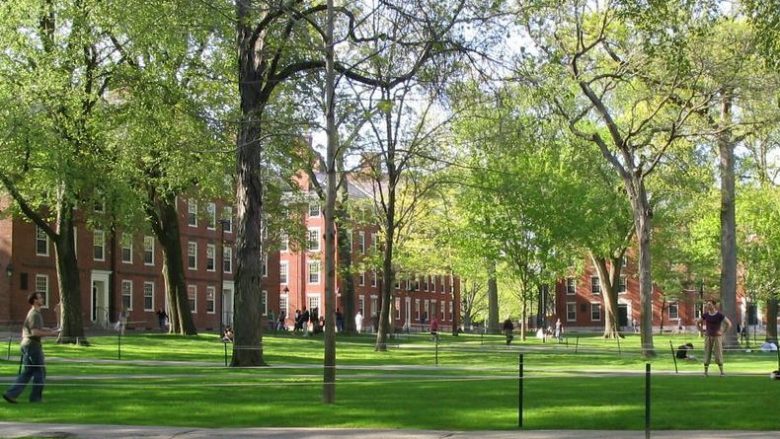Tax Harvard?
By Tom Joyce | April 22, 2020, 15:14 EDT
 Harvard Yard, the center of Harvard College in Cambridge, Massachusetts. Photo courtesy of Wikipedia.
Harvard Yard, the center of Harvard College in Cambridge, Massachusetts. Photo courtesy of Wikipedia. At a time where Harvard University received nearly $9 million from the federal government in the recent coronavirus bills, some say it is time for the government to start taking more money from Harvard and its peers.
Harvard University drew criticism recently when news broke last week that the world’s richest school would receive $8,655,748 in federal aid from the CARES Act. The government funding comes despite Harvard managing an endowment that was worth $40.9 billion in June 2019.
Schools like Harvard currently pay a 1.4 percent federal excise tax on endowments. The federal Tax Cuts and Jobs Act of 2017 provides federal taxing power over schools with at least 500 tuition-paying students and net assets of $500,000 or more per student. The provision affects 35 schools nationwide – including, in Massachusetts, Harvard University, Massachusetts Institute of Technology, Amherst College, Wellesley College, Williams College, and Smith College. However, none of that money goes directly to the state government of Massachusetts.
Arguments for and against taxing Harvard cut across ideological lines, as both sides find support on both the left and the right.
Jay Gonzalez, the Massachusetts Democratic Party’s nominee for governor in 2018, proposed a 1.6 percent state excise tax on endowments exceeding $1 billion during the campaign. It would have affected nine Massachusetts colleges, including Harvard, MIT, and Boston College, and was projected to raise nearly $1 billion per year.
Gonzalez introduced the plan, in part, to show how he would have paid for his proposed spending increases, which included universal prekindergarten.
“It is time for them to pay their fair share to help make our economy work for everyone in this state, not just those at the top,” Gonzalez said in a press conference at the time. (He declined to comment for this story.)
Gonzalez’s proposal was not new. In 2009, then-state Representative Paul Kujawski D-Webster, proposed a 2.5 percent tax on endowments over $1 billion (H.3955). However, the bill did not pass.
Matt Stoller, a left-leaning Harvard alumnus who formerly served as a senior policy advisor and budget analyst to the U.S. Senate Budget Committee, told New Boston Post that the billions of dollars many schools are sitting on should be taxable.
“Harvard is a hedge fund with a side hustle as an educational institution,” Stoller said in an email message. “Policymakers should tax it as such.”
On the right, in 2017 congressional Republicans pushed for and enacted the first-ever endowment tax on higher education. And Fox News host Tucker Carlson has proposed a one-time excise tax on endowments exceeding $10 billion to generate $120 billion to provide student loan debt relief of $5,000.
Over the weekend, venture capitalist Zak Slayback wrote a piece for The American Conservative, a paleoconservative magazine and web site, arguing in favor of taxing college endowments.
“Conservatism is about building and supporting institutions that allow families to plan for the future and build communities that make life worth living. It’s about smart tax policy that encourages the behavior, consumption, and spending habits that build that future,” Slayback wrote.
“The revenue brought in from American universities can help build an American future: helping Americans start families, paying off usurious debt, promoting domestic research, and bringing American manufacturing home,” he added.
Slayman agrees that Massachusetts should implement a tax on endowments. He also told New Boston Post that he is unhappy to see a school like Harvard receive millions of dollars from the government.
“When the PPP loans and CARES Act relief were announced a few weeks ago, people were rightfully outraged at the idea of financial services firms like hedge funds and private equity firms receiving bailout money,” Slayman said in an email message. “Harvard is one of the top 10 largest hedge funds in the world with $41 billion under management and its endowment’s only LP, Harvard University, pays no taxes on those gains.
“Generations of future middle-class Americans are stuck footing the bill for millions, if not billions, in bailouts to well-capitalized universities that don’t pay their own share,” he added. “On what possible conception of justice or capitalism is that fair?”
Still, not everyone is in favor of taxing wealthy schools like Harvard.
Neal McCluskey, the director of the Center for Educational Freedom at the CATO Institute, said he understands why people are tempted by the possibility, but argues it is ultimately a gift to the school.
“It’s hard to look at a place like Harvard, with its huge endowment and often very privileged students, and not think some of the school’s money should be taken for other uses,” he told New Boston Post in an email message. “But it is bad policy to target ‘the rich’ for extra taxation on the assumption that they have ‘too much’ and need to ‘give some back’.”
“That punishes success and disincentivizes striving,” he added. “And while it may seem like Harvard is hoarding, people freely choose to give to the university because they believe they are doing something of value with their donations — funding research, expanding access for students, etc. The overall rules for college giving may need reform — end tax deductions, for instance — but specific institutions should not be targeted because some people think they have too much.”
When asked about the school’s endowment in a recent interview with The Harvard Crimson, a Harvard administrator insisted that the school puts its endowment to good use.
“The endowment is very actively used,” said Thomas J. Hollister, Harvard’s vice president for finance and chief financial officer, according to The Harvard Crimson. “It’s the largest source of revenue for the University, and every penny that can be distributed and used for annual operations is so distributed. Harvard aims — similar to other universities and colleges — to distribute about 5 percent of the market value of the endowment every year.”
According to a national WGBH News poll in 2018, 43 percent of Americans believed college endowments should be taxed while 50 percent were opposed. However, in the 18 to 29 age group, 54 percent believed it should be taxed.










